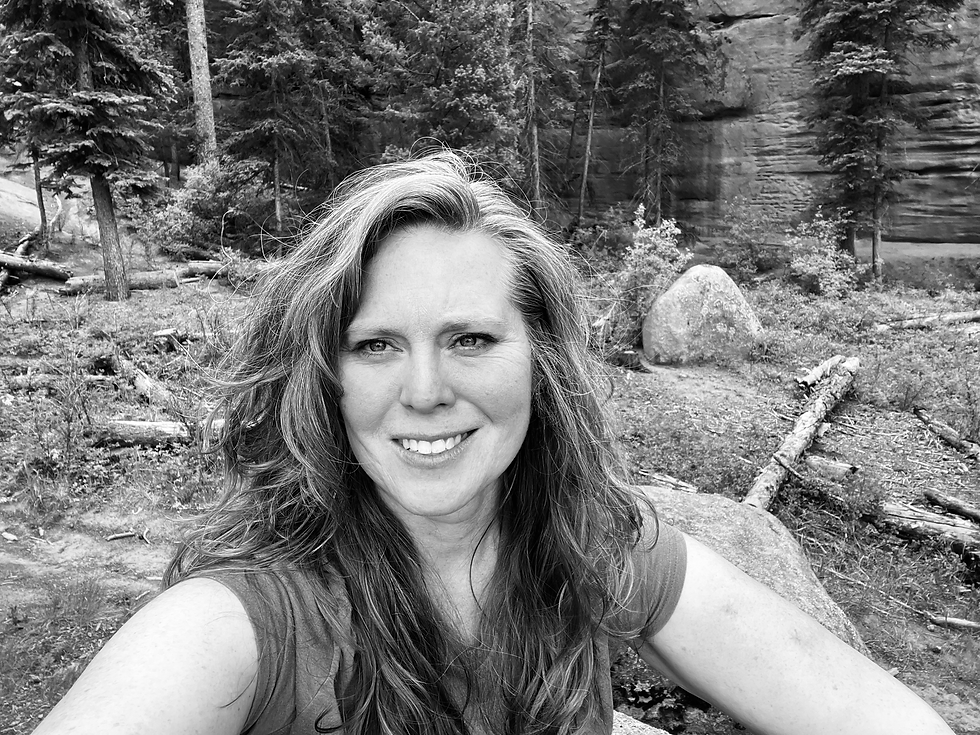Why I No Longer Work in Early Intervention—and What I Choose Instead
- mrglhic
- May 22
- 8 min read

I didn’t leave early intervention because the work was too hard. I left because the system wouldn’t allow me to do it with integrity. This piece shares the layered truth of what I learned, what I saw, what I tried to offer—and why I had to walk away. It’s a story about children, families, feeding, regulation, and the quiet knowing that real development can’t be forced. It can only be met.
Introduction
I didn’t leave early intervention because I stopped believing in early support. I left because the system built to provide it has lost its way.
For years, I worked in family homes—sitting on floors, following toddlers from room to room, and improvising based on whatever was available. I wholeheartedly believed in home-based strategies, in honoring the lived environment of each child, and in helping families find connection and regulation within their daily rhythms.
I still believe in all of that. But eventually, the system I was working within no longer allowed me to offer what I know is essential.
When I Knew I Had to Leave: A Moment of Divergence
The real turning point came when I was working with a set of twins who were nearing their third birthday. Both had profound feeding challenges—and what was needed was deep, attuned support. What they received instead was a checklist.
An occupational therapist on the team, trained in a workshop-based protocol like the SOS Approach to Feeding, insisted that the issue could be solved with a series of structured steps. But she didn’t understand the nervous system. She didn’t understand development as something that emerges from safety, from relationship, from sensory exploration and movement. She certainly didn’t understand imitation, or the cognitive flexibility it takes to try something new. And without that understanding, the protocol failed.
The twins weren’t defiant. They weren’t "picky." They couldn’t even imitate—one of the most foundational prerequisites for both eating and speech. They weren’t refusing out of willfulness. Their systems simply weren’t ready. But instead of asking why, the response was to blame the children—and then refer them to behavioral therapy.
And I still believe this: in moments like that, a feeding tube is kinder than behavioral therapy.
Because a tube doesn’t teach a child to override their body. It doesn’t demand performance from a nervous system in shutdown. It offers survival without shame.
The mother, already overwhelmed and disheartened by the conflicting models thrown at her, began to shut down. I didn’t have the rapport. I came in late. I tried to build trust—but the damage had already been done. The system had already failed them.
That moment made something very clear: I wasn’t going to survive in this structure unless I flattened myself to make others comfortable. I had worked too hard to reweave the pieces of development back together to break it all apart again.
Why I Stayed So Long—and Why That Changed
I stayed in early intervention as long as I did because I had space to do the work fully. In rural areas, I was often the only provider walking through the door. Referrals were scarce. Resources were limited. And the stigma around free services ran deep.
So when a child wasn’t talking—which was the most common referral—I had to figure out why. And that led me on a journey through the entire body.
I learned to work with motor development, sensory processing, oral-motor skills, feeding, regulation, and attachment. I saw firsthand how development moves from gross motor to fine motor to oral motor—and how trauma, disconnection, or dysregulation can halt that progression at any point. I learned how to support not just the child, but the parent who was struggling—because sometimes the plan doesn’t fail, the system does. And sometimes the system is a parent surviving postpartum depression without support.
But when I returned to a more urban model of early intervention, everything shifted.
Suddenly, everything was divided by discipline. Speech therapists did speech. OTs did feeding. PTs did movement. And nobody looked at the system as a whole.
When I showed up with integrated insight, I was met with ego, not curiosity. My knowledge was invalidated—not because it was incorrect, but because it didn’t come from the right box. What I offered created cognitive dissonance. And rather than exploring it, they rejected it.
It didn’t matter how clearly I saw the child. I didn’t fit the structure.
What Early Intervention Gave Me
For all its limitations, early intervention shaped me. I spent over sixteen years in living rooms, on floors, on front porches, in kitchens, and in the subtle, sacred space of the everyday. And it taught me things that no classroom ever could.
I learned how to support not just a child, but an entire family system. Sometimes the child referred wasn’t the one most affecting the family’s ability to function. Sometimes the child with the most unmet need didn’t qualify for services. So I learned to work relationally. I learned to pay attention to the sibling dynamics, to the way energy flowed (or didn’t) in a household, to what helped regulate or unravel a parent’s capacity to connect.
Early intervention introduced me to attachment—not as a buzzword, but as a lived experience. It led me to infant mental health and helped me understand how our emotional and cognitive capacities are shaped through relationship. It deepened my reverence for responsiveness and taught me how to support co-regulation long before language ever arrives.
It also taught me to notice what most protocols miss.
So much of the progress I witnessed wouldn’t show up on a six-month re-evaluation. Because the evaluation didn’t measure the subtle shifts—the foundational cognitive, social, or self-regulation skills that needed to be rebuilt first. I learned to watch movement, to track speech patterns, to see what wasn't listed on the form, and to name it back to the parents so they didn’t feel like they were failing. So they could see the slow, powerful story of their child’s becoming.
And early intervention taught me to become a detective.
In rural areas, I was often the only provider a child would see. If a child wasn’t speaking, I couldn’t rely on referrals to OT or PT or psychology. I had to understand why. I had to tease apart every thread: Was it sensory overload? Under-responsivity? A structural feeding challenge? Motor planning? A nervous system stuck in shutdown? A parent struggling with postpartum depression?
Often, the child couldn’t speak—not because they didn’t want to, but because the pathway into speech hadn’t been built. I learned that sometimes the strategy was technically right, but it wouldn’t take because the parent wasn’t available, wasn’t connected, or was simply surviving. And so I had to learn to support the relationship as much as the skill.
From Feeding to Flexibility: Seeing What Protocols Miss
Early intervention taught me to understand feeding as a whole-body, whole-system process. I saw how deeply it depends on sensory readiness, social engagement, and cognitive flexibility. Children need to mouth and explore objects before they can safely chew. They need to tolerate new textures in play before they’re expected to eat them. They need to imitate big movements before they can coordinate the fine ones that make speech and eating possible.
But most protocols skip that. They jump straight to bites and behaviors, without understanding that imitation, turn-taking, and emotional safety are the true entry points into shared mealtimes.
Feeding taught me what rigidity looks like—not just in the body, but in thought. And it taught me to honor readiness over results.
The Hardest Part Was Knowing What Was Possible—and Watching It Be Ignored
One of the most painful parts of working in early intervention was knowing what was possible—and watching that possibility get dismissed.
So many of the families I served weren’t ready. In rural areas especially, there was little awareness of developmental red flags, and even less value placed on prevention. Parents would tell me stories about cousins or neighbors who didn’t talk until they were three or five, and they clung to that as proof everything would be fine.
But I could feel what was unfolding. Not in a “window is closing” kind of way—but in the very real sense that there was a limited opportunity for me to work with the child and the family. And that window—my window—was often frittered away. Not because the child wasn’t ready. But because the people around them didn’t take the work seriously.
Because I was on the floor playing, they assumed I wasn’t doing anything.
Because I wasn’t pushing or performing, they assumed I wasn’t a professional.
But what they missed was that I was tracking the nervous system. I was building trust.
I was holding the space where real change could begin. And so often, by the time anyone recognized that, it was too late for me to help.
That was hard.
So was the structure itself. Weekly visits were the model—but that’s not how life actually works. That kind of rigid scheduling doesn’t honor the pacing of the child or the family. And if I missed a session, even for a good reason, I always felt like I was to blame. But the truth is: weekly is not necessarily right for everybody. I’ve come to understand that Idon’t get to decide how often a family needs support. The system tried to make me the decider—but I was often wrong. Healing doesn’t happen on a calendar.
And then there was this: I didn’t look like the kind of speech therapist people expected.
I didn’t strap children into high chairs. I didn’t drill them with flashcards. I didn’t force them to talk. Because I never found any sense in that. Why would I force someone to speak when their system isn’t ready? Language should emerge from safety, from play, from presence—not from pressure.
One of the most painful myths I encountered over and over is that children don’t want to progress. That they’re lazy. That they’re resistant.
But I’ve never seen that. Not once.
The human spirit wants to grow. Children are natural-born progress-seekers. If they’re not doing something, it’s not because they don’t want to. It’s because they can’t. And when you give them the right support—when you meet them developmentally, when you bridge the gap—they move forward. Always.
It’s not a matter of will. It’s a matter of readiness.
And honestly—if it were just a matter of making a child talk, the parents could do it.
They wouldn’t need me in the house. That belief—that a therapist has some magical authority to force development into existence—is not just misguided. It’s disrespectful. It erases the love, the effort, and the insight parents are already bringing every day.
If the child isn’t talking, it’s not because no one has tried. It’s because something deeper needs to be met.
What I Choose Instead
I didn’t walk away from children. I didn’t walk away from families. I didn’t walk away from early development.
I walked away from systems more invested in categories than connection. I walked away from professional silos that say my knowing only counts if it fits inside someone else’s scope. I walked away from environments where “team” means compliance, not collaboration.
What I choose instead is integrity.
I choose to honor the integrated knowing I carry—across the nervous system, sensory processing, oral motor skills, movement, feeding, language, and attachment—not as separate specialties, but as one living system.
I choose to meet children before they collapse into survival patterns. I choose to walk with families before they burn out trying to follow plans that don’t fit their lived experience.
I choose presence over protocol. Pacing over pressure. Safety over surface-level success.
I choose to practice in a way that doesn’t ask me to fragment myself. I choose to stay rooted in relationship. I choose the slow path that honors the whole body, the whole family, and the whole story.
And for the families who find me—who’ve tried everything, who feel like no one sees what they’re carrying—I’m here.
Outside the system. But deeply inside the work.


